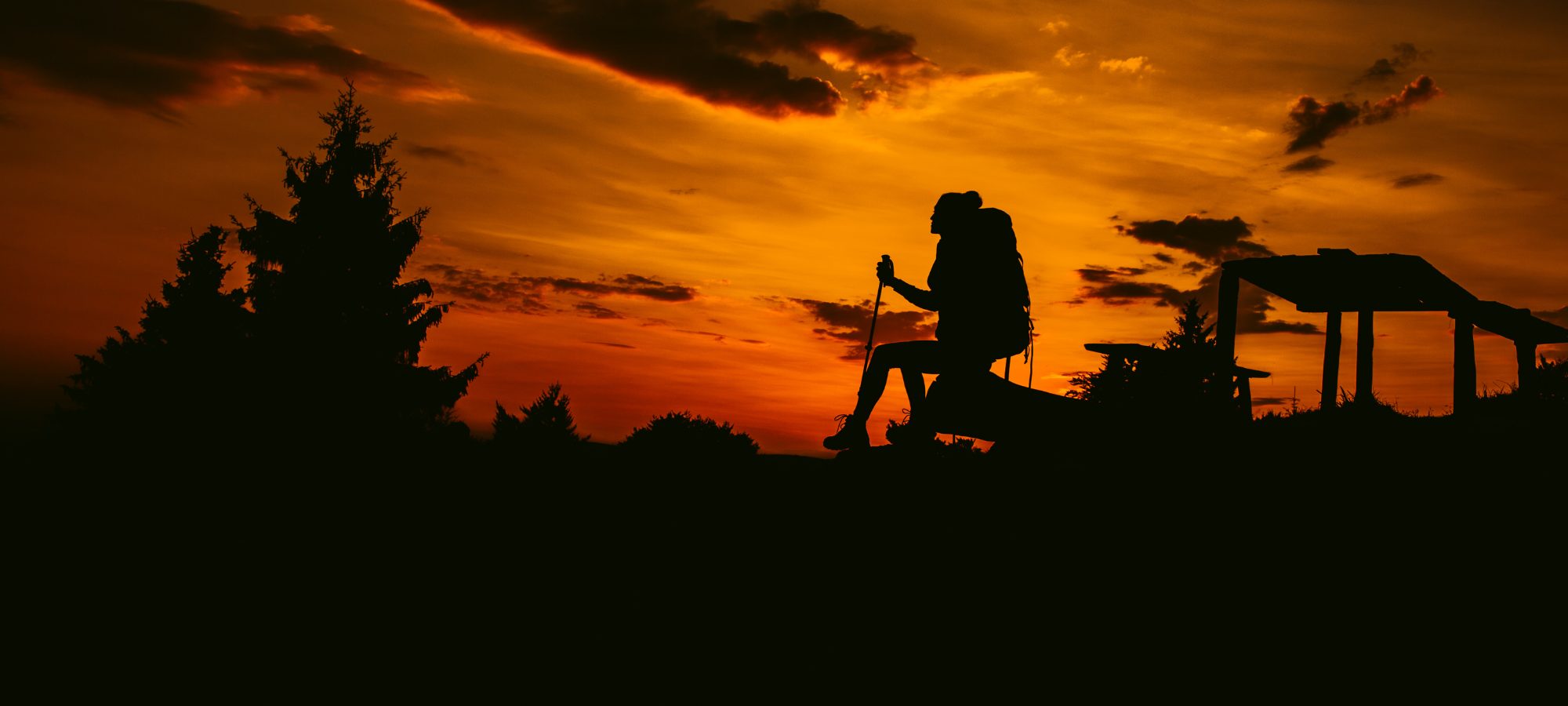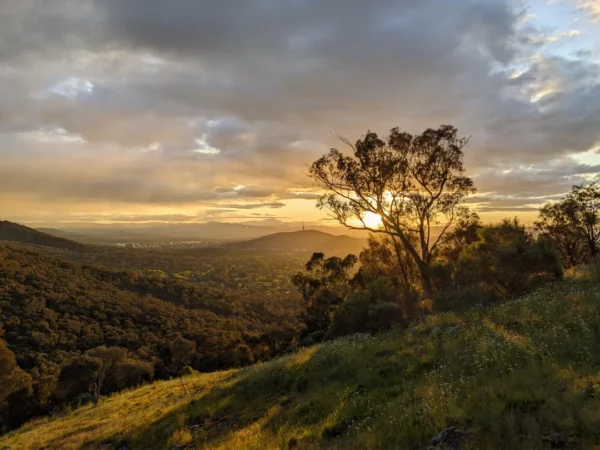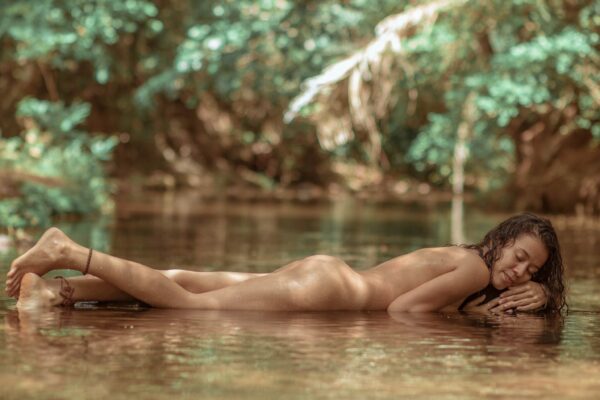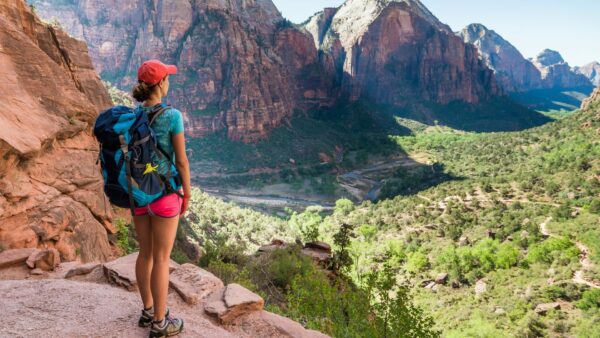Most women I know would never consider hiking at night. It’s dark, it’s cold, it’s creepy, and didn’t your parents always tell you to be home before nightfall? But is it really dangerous to hike at night?
It never occurred to me to hike at night until it became the only time I could hike at all. Juggling work and kids, my daylight hours were totally packed. I was forced to go training after I’d tucked the kids into bed.
What I discovered really surprised me.
Firstly, I was scared. It’s uncomfortable to walk on bush trails after dark, even in a group of giggling women. I’ll never forget the terror-tinged excitement when I first turned on my head torch to face the darkness. We tip-toed through the bush, senses on full alert, jumping at shadows, rustles, and imaginary monsters as we walked. Our vision was reduced to the tiny pool of light before us as we navigated each step. I was terrified when it was my turn at the back, expecting to be grabbed from behind at any moment.
But once the fear subsided, I began to realise that night hiking is as magical as it is terrifying. In fact, it wasn’t so terrifying anymore. It was peaceful. The moon shone bright and I could see clearly, even without my torch. The rustles that once felt sinister became sweet, unfamiliar music, as owls hooted, possums lept from tree to tree and leaves were lit with a soft, silvery light.
The funny thing about night hikes is that nobody ever wants to do them. They moan and complain, and people always cancel. Yet every single time we finish a session, everyone climbs back into their cars with cold cheeks and warm hearts, thankful for another evening spent experiencing nature instead of Netflix.
It can be dangerous to hike at night, and there are a number of factors to consider. These differ depending on where you’re walking – in urban bush, wilderness or suburban streets or cities. Some neighbourhoods are safer than others, and I’d personally never night walk alone, or in an unfamiliar city. There’s safety in numbers so get a group together for night hiking, make sure you’re familiar with the tracks and ensure you plan, prepare and practice using the tips below.
If you’re able to manage the risks, night walking can be safe and extremely fun.
If you’re still unsure if night hiking is for you, here’s some myths I’d like to dispel:
Myth 1: Day is the best time to hike
This all depends on where you are and what you hope to achieve. Night hiking can be a great option in extreme heat, when it’s the only time you can fit in exercise, or when you’re in training for a sunrise summit. It can also become a cool adventure if your regular trails have lost their gloss.
Myth 2: You need to light the night
While it’s essential to carry a good head torch and spare batteries on a night hike, it’s not essential to light the night. Once you’re comfortable and confident on the track, you can practice developing your night vision by walking without your light on. It heightens your senses and is truly exhilarating.
You’ll be amazed at how well you can see on a clear night, even without full or partial moonlight. Alternately you can use a head torch which has both a red and a clear lens. The red lens provides extra vision without knocking out your, or anybody else’s, night vision. Take care not to shine your light into anyone’s eyes, as this will instantly kill their vision.
However, if you’re a night hiking newbie, or on a time limit, it’s best to fully illuminate your footsteps to highlight trip hazards on the track.
Myth 3: Night hiking is only for the seasoned hiker
Bollocks! Night hiking is for everybody. Some of our most fun night adventures have been with mums and teenage kids who’ve fallen in love with hiking after just one starlit adventure. Night hiking is all about planning and ensuring you’ve got the right gear, route and conditions for your level of expertise.
If you’re a newbie, it could be dangerous to hike at night, so stick to known trails that you’ve practiced in the daylight and always go in a group. If you’re a seasoned hiker walking through local bushland, take the opportunity to include rock scrambling or tip toe off track and explore places you’ve never seen before. Night hiking has something for everybody provided you do your homework first.
Here are some of my top tips for staying safe in urban bushland and falling in love with nighttime adventures.
Choose your time
Starting at twilight and hiking into sunset and moonlight is a beautiful way to introduce yourself to night walking. Some hikers prefer starting in the dark before first light to catch the morning twilight, which is often magnificent. Once you’re experienced, you can head out after you’ve put the kids to bed to dance in the moonlight and go wild without a worry.
Choose your route
Start on a local trail that you’ve done many times before so you don’t get lost and you know the potential hazards ahead. Everything looks different after dark so you’re guaranteed an adventure. Even if you’ve trodden a trail a thousand times before, you’ll discover something new at night.
Choose your buddies
There’s safety in numbers at night so invite your buddies to join you. Put the biggest scaredy cat at the front of the pack and swap around the tail end Charlie position until you’re all feeling comfortable. Keep an eye out for the last person because if they lose the group, it can freak them out.
If you’re interested in night hiking but still a little nervous to go with just a few friends, join an event such as Coastrek! You can walk before dawn and after dark surrounded by thousands of other women and reclaim the night.
Choose your gear
The same gear as for day hiking applies but don’t forget your head torch, spare batteries and your phone. Boots with ankle support are also recommended as these help prevent ankle injuries from unseen trip hazards. It’s also a good idea to bring a thermos for a cuppa tea or hot choccy in winter or a mini bottle of bubbly in summer but keep your pack light to start with. If you’re training with a heavy pack, don’t forget your poles. Also, is expensive hiking gear really worth it? The short answer: Sometimes.
Choose your pace
Slow down both for safety and so you can observe the wonders of the night. You can also try hiking silently, which I find difficult (ha ha), because it allows you to see the wildlife and immerse yourself in nature’s wonders.
While it can be dangerous to hike at night, night hiking is also a fabulous opportunity for us to experience new adventures and build our resilience. Embrace your innate wanderlust and take advantage of another opportunity to move your body and feel fabulous in the wild.









